WNET / UCH Urban Academy
“Exploring Powerful Ideas Inquiry-Based Teaching: Discussing Fiction”
Lolita 26 min
STUDENT:
Can I please say something?
SHEILA:
Yes. This is actually your turn now.
STUDENT:
She’s dominating him.
SHEILA:
What do you guys think of that that he sees her as a pet?
LANGSTON:
(interview)
Here at Urban, it’s much easier to stay engaged because you’re open to sharing your ideas and putting out your own viewpoints and be able to debate them and not have a teacher kind of shut you down.
JAMES:
(interview)
There’s definitely a respect for student opinion and it’s very important at Urban because it helps us. It helps us think critically. It helps us think for ourselves.
SUHLIAH:
(interview)
I like the fact that if I want to say my opinion, I can say it as opposed to my other school where [inaudible – laughter over voice] as much and here we talk about everything.
SHEILA:
(interview)
My name is Sheila Kosoff. I teach literature. I’ve been teaching literature almost for about seven years here at Urban Academy.
(in class)
Hi!
(interview)
This semester, the course I’m teaching is Psych Lit. we are focusing on the text Lolita by Nabokov.
(in class)
Alright. So you guys just read part two, what do you think so far, what are your thoughts? Do you still like Humbert? Do you still think he’s interesting?
(interview)
I teach literature here using the inquiry method that was developed by Urban Academy. Inquiry is very student driven, very student centered so I can have an idea of where I want them to go, of what I want them to do but I don’t want to come out and say it because if I say it then it becomes a very passive experience for the students.
JAMES:
As it goes on, we see a lot less of him trying to seduce the audience with his language and we see a lot more of his insecurity to come through.
SHEILA:
So James is saying that he’s not trying to seduce us anymore. Do you guys agree? Do you think it’s over? Do you think the romance is over between us and Humbert? Shawn, Langston, Lee.
SHAWN:
I agree with James. I think now it’s becoming, like, you kind of feel sorry for him now.
SHEILA:
For Humbert?
SHAWN:
Yeah because you see, you don’t see him as a pedophile anymore, or as a creep, you see him as a little kid now. So like my whole perception did a complete 180. At first I was like, he’s a creep, a pedophile trying to justify what he’s doing but now I just see him as a little kid who is just stuck.
SHEILA:
Oh so he’s this child stuck in Wonderland, like Peter Pan? Okay.
LANGSTON:
I think you see a much more desperate side of Humbert. I think it’s like, it’s much more… It’s no longer the romanticized kind of relationship he’s having with Lolita. It’s more like him being very possessive and trying to keep Lolita.
SHEILA:
(interview)
Like today when I came into the class, I had a question in mind. I wanted to look at the difference between part one and part two but I didn’t want to tell them, “Did you notice at part two this happened?” You know? I wanted to see what they noticed.
(in class)
Lee?
LEE:
I agree with Langston and I feel like a big part in our perception of Humbert changing is that he kind of embraces the fact that he’s crazy instead of trying to like, I don’t know, you know, take away from that idea. He says, “Yes. I’m a madman”. I’m crazy and he has this sort of desperation and he’s really frantic with the way he acts around Lolita and acts towards her as well.
SHEILA:
(interview)
It’s quite similar to the way you run a seminar in college. You sit around the table and you have discussion, where everything is discussion based. It’s very easy, I find, to teach literature that way because you can get into the text and there’s no right or wrong answers and kids can take chances.
STUDENT:
When you see someone going, like, if you ever watch the Nature Channel, seeing a lion hunt its prey like its exciting as the tension builds up but then its after, okay, you have it, big deal. You’re fed. It’s not as exciting anymore.
SHEILA:
Alright so you’re kind of tapping to the fact that he’s a predator.
STUDENT:
Right. He’s a complete predator.
SHEILA:
Yeah, the hunt.
SHAWN:
I think he’s the prey though.
SHEILA:
Alright you think he’s the prey. James?
JAMES:
I kind of agree with that, that he’s prey in this situation.
SHEILA:
That he’s the prey?
JAMES:
To some extent. I mean, he makes the argument in the first part early on that, um, that he as a nympholept(?) is a victim of the nymphets and he was talking about the actual seducation phase but now that he’s actually in a relationship with Lolita, you see a lot of him if not being victimized then definitely being the submissive one in the relationship.
SHEILA:
Alright so you guys think that she is in control, that Lolita is in control of Humbert in part two. Alright, Elliott?
ELLIOTT:
I agree with…
SHEILA:
(interview)
One of the things with inquiry that you have to do is you have to over-prepare. You have no idea where its gonna go in terms of conversation since its student-driven. A lot of the kids were saying how they were seeing how Humbert the character is more like prey. They don’t see him as a predator. So I have parts of the text that show that he is a predator.
(in class)
Okay, so if we turn to page 146. This is when they go to the hotel. This is when they’re starting their journey, their cross-country journey through America right. He says, “Children welcome. Pets Allowed.” You are welcome, you are allowed. So what do you guys think of that because you were saying in part two that he’s really a prey but he sees her as a pet.
(interview)
So I pick out passages I think will help the think about what they’re saying, not to change their mind but to get them to deeper what they’re saying. Look at this other evidence.
(in class)
On page 148, this is after, um, you know, he’s trying to get Lolita to do what he wants, right? So he says mentally – do you see that part – mentally I found her to be a disgustingly conventional little girl which speaks to-
STUDENT:
Where is that?
SHEILA:
This is on page 148. So why put up with her? Why keep her if she’s a disgusting little girl? Why hold on to that? Shawn?
SHAWN:
I don’t know about this part right here. I can’t say anything to that but can I say what I was gonna talk about before?
SHEILA:
Yeah, absolutely.
(interview)
Sometimes I may bring something up and nothing happens and I’m like, “Oh well, that didn’t work so…” (laughs)I have another trick to pull out.
(in class)
Page 150 on the top, he says, um, who wants to read for me? Go ahead. Alisha.
ALISHA:
(reading)
However, forget Dolores Haze and so called legal terminology. Terminology that accepts the rational as lewd and lashivos…
SHEILA:
Lascivious.
ALISHA:
Lascivious cohabitation.
SHEILA:
Alright so he’s saying maybe if you’re really good we can make this legal, you know. Imagine that. You know, I’m a pedophile. You’re my victim. You know if you’re really good, Suhliah, we can make this legal, you know. Go ahead. (laughs) And you guys think she’s in control, right? Go ahead.
ALISHA:
I am not a criminal sexual psychopath taking indecent liberties with a child.
SHEILA:
Is that true?
CLASS:
No. No. Definitely no.
STUDENT:
No but she’s going after him. He’s not doing anything wrong.
SHEILA:
Alright. That’s what he’s telling you, right? Alright, continue.
ALISHA:
The rapist was Charlie Holmes. I am the therapist. A matter of nice facing in the way of distinction.
SHEILA:
Alright so the nice facing means what?
JAMES:
No space between the rapist and…
SHEILA:
(in class)
Right so there is no space between the rapist and the therapist, right?
(interview)
I feel like I’m constantly providing them with ideas to wrestle with. Here’s an idea. What do you think of this idea?
STUDENT:
I mean, I feel like he is scared of himself. Does that makes any sense? No, that’s crazy. I really do think because the thing is she has so much power over him and he’s just, as time goes on he’s just losing it. He’s letting the monster within him just be out there with Lolita.
SHEILA:
He should just let the monster loose.
STUDENT:
And so I think he’s also kind of scared of that. So it’s like he got what we wanted now he doesn’t know what to do with it and it’s driving him crazy.
SHEILA:
(interview)
And it’s also being patient because sometimes students need time to think about what you’re saying and then they’ll process it.
(in class)
Ebony?
EBONY:
Um, can go back a little bit?
SHEILA:
Yes, of course.
EBONY:
We were talking about how he called her a “disgustingly conventional little girl”. Um, I think in part one that he wanted Lolita, he knew that she was disgusting, and he felt the same way about her in the beginning but he wanted her because I felt that he was still a little boy. And once part two came, after he had her and everything like that, I feel like he started to realize, “Okay, I am not a little boy”. I’m a grown man and this is a little girl and I’ve run away with her. And now I have to tell her not to say certain things and make her realize if she says something that I can get in a lot of trouble for this. I think in the beginning it was just a dream. He didn’t really think he would be able to get Lolita. And once he got her, he kind of woke up and was like, “Okay, now I have to figure out how to cover myself because I can get in trouble for this”.
SHEILA:
Nice point.
SHEILA:
(interview)
This is the lesson, being constantly motivated by an idea and looking at an idea. I think that’s very powerful.
ALISHA:
(reading)
I’ve a learned book here about young girls. Look, darling, what is says. I quote, “The Normal girl” – normal like you – “the Normal girl is extremely anxious to please her father. She feels in him the forerunner of the desire of the illusive male. Illusive is good”. By Polonius.”
SHEILA:
(in class)
So here he’s looking at Self-Help books looking for him to be a better father but he’s a pedophile. He’s not a father, right? He’s out of his mind, right? Hey, look, you’re supposed to please your Dad, you know? But how does he want her to please him? Not in your typical normal way.
(interview)
And I always tell the students, look, I’ve read this book. I know what happens. I have my own ideas of how to look at a character but its interesting to other people to hear what you have to say to each other.
SHEILA:
(in class)
Alright, um, Cathy?
CATHY:
I’ve learned that this is like a marriage. Like, because Humbert Humbert is finishing the relationship that he first had with Anabel because it got cut off right when he was about to have sex.
Now he’s finishing it off with Lolita and after he got what he got, it was like he never really had to take care of Lolita because the mother was there. And then once the mother was gone he finally had to take care of Lolita and keep her as, uh, I guess a girlfriend. But now that the responsibilities are coming on, that’s why he thinks she’s like a pet. Because when you see a pet from afar you’re like, “I want it! I want it!”. When you have it, it’s like there’s so much that comes along with it.
SHEILA:
Alright, Megan?
MEGAN:
I think that part two just gets really, really annoying because, because he starts whining a lot and I think it does have to do with the fact that he starts, he stops being able to live in this delusion that he’s doing great things. And like, um, and like he stops being able to live in his delusion of this perfect like that he has with him and Lolita. And you see him get so like see his self-hatred start to come out a lot and he starts being like, “I’m a monster. How could I take her childhood away from her?”
SHEILA:
But that doesn’t happen until the end.
MEGAN:
Right. And like so you- but its like a progression. It builds up to his final really seeing himself as a monster and seeing all his self-hatred come out and I think that like, in terms of him calling her his pet, he’s always talking about how Lolita has this spell over him, like, he can’t control going after her. It’s like this magic, magic thing that she has over him but then at the same time, he steals her money so that she can’t get away from him. He does everything in his power to control her so it’s- I think its just all part of Humberts manipulation to try to make the reader think that he doesn’t have control over the situation. He can’t control that he loves Lolita. Um, when in actuality, he is just completely possessive over her.
SHEILA:
It’s the student’s education. It’s the student reading the book so if the student has to take responsibility and be an active member in the discussion and even if they don’t speak but they participate by listening, by watching what other people are saying, by taking notes. What is important is that they learn to hear each other. They learn to process and they learn to look at the evidence that is presented and think about it.
JAMES:
In the second chapter, he tries a lot harder to be a father to Lolita than he does to be a lover and I am not entirely sure why. I think a lot of its is not as much control as it is trying to preserve her childlikeness, the way he buys her things and the way he just kind of like talks to her even is a lot of him trying to keep her at a certain age.
SHEILA:
And that kind of, um, adds to what Ebony was saying because in part two he is trying to be more adult. He is taking on responsibilities. He’s looking for a school for her. He’s being a dad but he doesn’t quite succeed. (laughs) Stop being a dad. Alright, Lee?
LEE:
Yeah I agree with James. I would say I disagree with what Ebony said about like how he comes to terms to being with a grown man. I completely disagree with that. The reason why he was telling her, like, “Oh you know, keep this quiet”. I don’t think it was so he realized, “Oh, I am an adult. I can get in trouble for this”. I think getting in trouble for him was like nothing. The reason he didn’t want to get in trouble was because she would no longer be his. That would no longer be his possession and his pet and that’s what he wanted. He wanted to keep everything the way it was because this is like a pedophiles dream.
SHEILA:
(interview)
So the students learn from each other. They direct discussions and I like when they say “I agree with you” or “I disagree with you” or they build up their own arguments based on what someone else has said.
LANGSTON:
What I was gonna say was I guess kinda similar to what James was saying but I think Humbert is, you know, really scared of rejection. And you can see this here with Lolita how he is desperately scared of her leaving and her going with Quilty and her going with other kids her age and just like anything she does puts him on edge because he is really, really scared of losing her and being rejected by her.
SHEILA:
Anita?
ANITA:
I agree with Megan. Um, there is a progression. If he isn’t growing up ever so slightly, he’s slipping into a different type of his already ever-present psychosis. He starts to kind of lose his mental childhood or his completely delayed mental childhood in the second half and he’s like Peter Pan. He’s that child who doesn’t want to grow up, who doesn’t want to deal with whatever happens after puberty. He doesn’t want to lose his childhood so he can be with her. In the second half he starts scrabbling for her the way, like, kids when they’re nine, ten, about to get older want to get more attached to their parents, want to do things the way they did when they were younger and sometimes cling to their younger siblings. He’s just acting like the child who doesn’t want to grow up. He’s like Peter Humbert really. Humbert Pan whatever you want to say.
(classroom laughter)
SHEILA:
(interview)
What we’re trying to do is mirror the process that happens in writing. So when you have discussions, you raise questions, you have your own opinions, you bring those up, you look for evidence.
(in class)
Alright on page 150, finally let’s see what happens if you, a minor, accused of having impaired the morals of an adult… who wants to read that one for me? Now listen to what he says to Lolita. First, he says, “I am your father and I am speaking English and I love you” and then he goes-
ANITA:
(reading)
Finally what happens if you, a minor, accused of having impaired the morals of an adult in a respectable Inn, what happens if you complain to the police of my having kidnapped and raped you? Let’s say they believed you, a minor female who allows a person over 21 to know her carnally?
SHEILA:
(interview)
One of the things I find effective is having them read themselves the passage and then having them think about what the reaction should be. What did I just read? What is Humbert doing?
ANITA:
(reading)
While I stand gripping the bars, you, happy neglected child will be given a choice of various dwelling places, all more or less the same: the correctional school, the reformatory, the juvenile detention home or one of those admirable girls protectorates where you knit things and sing hymns and have rancid pancakes on Sundays. You will go there, Lolita, my Lolita. This Lolita will leave-
SHEILA:
(interview)
This is one of the things I try to get them to do is to get them to re-read and to re-think and then bring up again questions that they might have about what’s happening in the text. And then discuss it together as a group.
ANITA:
(reading)
This is the choice. Don’t you think in these circumstances Dolores Haze better stick to her old man?
SHEILA:
(in class)
Okay, so here you have it. What do you guys think of this passage here? First he tells her, “You corrupted me”.
STUDENT:
It seems like he’s lost all hope because this is like a trump card you pull… he basically brought out everything that was underlying in the discussing this he was doing… He just brought out everything. He was like, “Okay. It was statutory rape. Okay. I’ll probably go to jail for ten years. But do you really think it’s right?” He’s trying to use reverse psychology, which is really simple. And a really nonchalant way like, “Don’t you think that under the circumstances Dolores Haze better stick to her old man?” Like it’s really all okay. He can only consider himself as her old man because he needs kinda like a cover. He needs a moral cover for himself and moral cover for society.
SHEILA:
Okay. Shawn?
SHAWN:
This is a different side of him that I’ve seen, like, remember when I compared him to – um, Humbert yeah, Pride and Punishment. Like in Pride and Punishment he would always change how he would act like “I’m gonna go to the bar. Maybe I shouldn’t. Maybe I should. But I want a drink.” That’s what he’s kinda doing now. He’s like calm and then as Amari brought up, he’s like, he’s not like, I said in parts it seemed like he was innocent and she was controlling him but he just went the extra mile, yeah. I picture this as him, like, yelling at her and her just standing there like, shocked.
SHEILA:
And I think DJ said that he’s embraced his monster.
SHAWN:
Yeah.
SHEILA:
Cierra?
CIERRA:
I just think that he… he’s so smart and slash Lolita’s stupid.
SHEILA:
You think Lolita’s stupid?
CIERRA:
Yeah… because…
SHEILA:
You blame her? She’s a kid!
CIERRA:
She seduces an old man.
(students all talk over each other)
SHEILA:
This is Humberts story. He’s telling you what she did.
CIERRA:
What?
SHEILA:
Do you believe him? Do you still believe that she seduced him?
CIERRA:
Listen, you. Anyway, I just think that he, like this is a really smart thing to do to make her-
STUDENT:
Rancid pancakes.
CIERRA:
Yeah. To make her scared about going to the police or leaving him because it’s true. She is, how old is she right now?
SHEILA:
She’s thirteen.
CIERRA:
She’s thirteen. No thirteen year old is going to be able to live on their own.
SHEILA:
(interview)
I find that students are really good at discussion but now when you have to put it down on paper it becomes a real challenge for them. I meet with them individually to see what they’re writing about and sometimes that will come up in class discussion. They’ll say, “Well this is what my paper is about, this very thing we’re talking about.” And I tell them to use that, anything that comes up as the evidence that they’re gonna need for their analysis.
(in class)
Anita, could you continue reading for us?
ANITA:
Sure.
SHEILA:
Where you left off.
ANITA:
Okay. “But if I manage to establish that background of shared secrecy and shared guilt, I was much left successful in keeping her in good humor. Every morning during our year-long travels, I had to devise some expectations, some special point in space and time for her to look forward to, for her to survive til bedtime.
SHEILA:
Okay stop. Now this, I think this is like so sad. I mean, what do you guys think of that sentence? “Every morning during our year-long travels, I had to devise some expectations…” He had to give her something to look forward to so she could survive until bedtime? I mean, you guys are saying she’s in charge, he’s the, you know, prey. Poor Humbert. He’s the victim.
(students talking at once)
She has the floor guys.
STUDENT:
I honestly do feel like I’m reading another book, this part two.
SHEILA:
In what way?
STUDENT:
Because it’s a different character.
SHEILA:
In what way?
STUDENT:
Because Humbert’s being himself.
SHEILA:
So he’s finally come out? The mask is off.
STUDENT:
Yes. Like Batman is out. He is all out there. Mask is off and everything. The Joker took the make-up off and all that stuff. But like it’s a different book because his personality is more out there.
SHEILA:
Lee.
LEE:
I would say, I feel like he’s like this paragraph, I feel like it’s not him being really firm with her. I still think it’s him being like childish in the way that he’s trying to persuade her. Like I kinda read it the same way Anita did, like, “Oh you know a nice grim matron of the Miss Phalen type”. You know, like this is what will happen to you, Lolita. Like stay mine, stay my pet.
SHEILA:
You don’t think that’s cruel though, in a way?
LEE:
It’s so cruel. It’s like disgusting. It’s sick.
STUDENT:
It’s taking her leverage away from her. It’s like a game.
SHEILA:
(in class)
Okay. Taesha? You think it’s brilliant?
(interview)
I want them to feel invigorated by the discussion. Sometimes they take the discussion in the hallway which is always really, really great for me to see or any teacher to hear, what happened in class has spilled off into the hallway. So there is no end in terms of your traditional lessons where you have “Do now” and you have the objective, this is what you do and this is what’s supposed to happen with the lesson because this is an ongoing process.
STUDENT:
If I believed any of this is true…
SHEILA:
Okay, what do you mean by that?
STUDENT:
I don’t believe any of the story is true. We’ve already talked about this. I think he’s a liar. I think he made all of this up but if I believed any of it, I think, it’s Lolita’s fault.
SHEILA:
You think it is Lolita’s fault?
STUDENT:
Yeah.
SHEILA:
In what way?
STUDENT:
I think because if Lolita wasn’t a little bit flirting with Humbert in the beginning, Humbert would have never wrote this entire book that like – I don’t know. I feel like it was Lolita’s fault. I think that everything Humbert goes through, Lolita seduces him. I don’t feel bad for her. I feel that everything she is getting she deserves.
SHEILA:
Wow.
MEGAN:
But we never even know if she’s actually flirting with him.
STUDENT:
I said, if I believe any of this, I don’t believe any of this.
SHEILA:
Megan, I’ll put you on the list. (students talking) Alright, James?
JAMES:
I think, well, just touching on what she was saying on whether or not this is a true story, I think that the fact that he was involved with the child is probably true. I don’t think… Most of the details, I think, are probably falsified only because this kind of reads, to me at least, as a very, like idealized, self-preserving version of a story of pedophile and his nymphet because, I mean, he tries to make himself look for the most part guiltless even though he was clearly the one violating a child. And I feel like he was, if he was just coming up with a crazy story in his head, um, like, talking about what happened in his life and what led to him being in jail, he wouldn’t try to represent himself as a pedophile unless there was some degree of truth to that because, I mean, otherwise you just can’t really make yourself seem as guiltless as he’s trying to.
SHEILA:
(interview)
I could just say Humbert is evil. He’s a pedophile. You know, in part two he’s lost his mind but if I say it then they just sit back and just take notes. So it’s like being comfortable with the fact that you don’t have control in the way of the tradition sense. It’s really about losing control in terms of allowing the kids to take over in a way that’s conducive to learning.
(in class)
Did you finish?
STUDENT:
Yeah.
SHEILA:
Okay. Lee.
LEE:
I would say it’s really, really- I think it’s really important to remember that this is Humbert’s story. I have no idea if his perception of things is what actually happened. I feel like putting the blame on Lolita is kind of like, I don’t know, kind of rude because like you really don’t have like any idea of like, you know, what actually happened on her part. Like how she acted towards him, how she felt about him. It was like Humbert’s mind. What Humbert wanted, you don’t even know if like, you have no idea. This is all just his story or a crazy persons story. Like a psycho’s idea of like his, you know, love for Lolita.
SHEILA:
Okay. Um, class is over. Tomorrow we’re going to continue and we’re gonna look at psychopaths and determine whether or not he is one. Yes?
(interview)
What’s great is, about inquiry, is you can also go back to something that you think is important as a teacher for the students to really discuss and I can do that tomorrow. I have a list of what to look for in a psychopath and go back and have them really examine what they said based on this. And they could completely disagree. Or they can see it differently or think about it more.
(music fades in)
LANGSTON:
(interview)
Everyone in the class is progressing. You talk about things that are happening in the book and by that it kinda stays in your head so as you continue reading, you’ll think back on things that were spoken about in class and make some connections.
JAMES:
(interview)
That’s what’s so great about being able to discuss your own ideas because you can say what your interpretation is and that is very important in coming to be able to think critically about a text.
SUHLIAH:
(interview)
If it was like it was in my old school where they just gave us the book to read, I would have no interest in the book at all. I would probably wouldn’t read it. I would probably go on the internet and see what other people said about it but here it’s like I wanna understand why he is the way he is and I think everybody finds a little bit of something that they’re interested in when we analyze it this way.
* * *END OF AUDIO* * *
* * *END OF TRANSCRIPT* * *

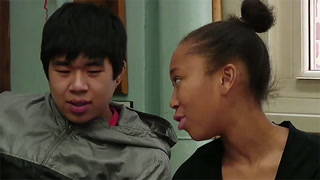
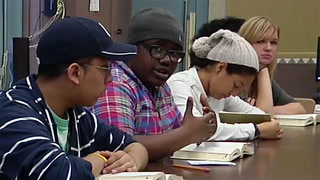

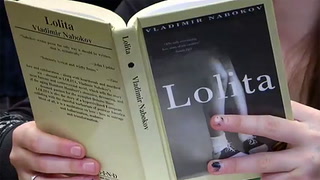

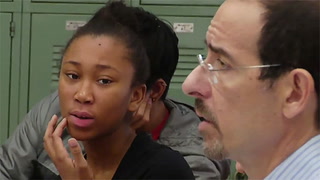

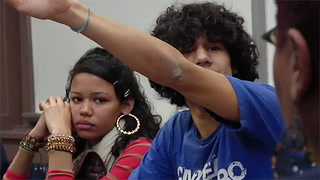
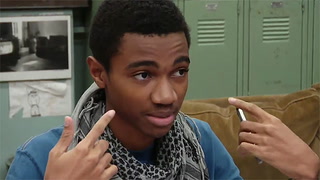

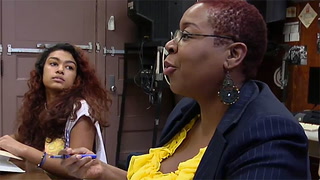
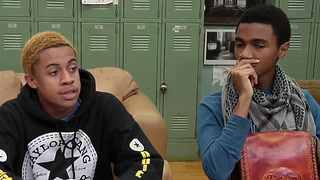








11 Comments
MR Tesco Dec 6, 2016 3:02pm
kim alton Jun 21, 2016 10:08pm
kim alton Jun 21, 2016 10:05pm
L Smith Jul 18, 2014 5:52pm
Lynda Abel Jan 13, 2014 7:16am